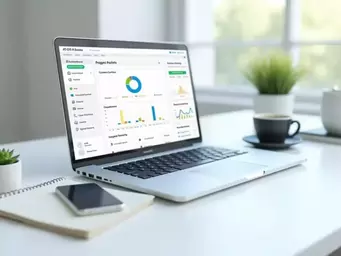Enhancing Marketing with Predictive Analytics

Are you ready to elevate your marketing game with the power of data? Predictive analytics offers small businesses a unique opportunity to forecast trends and tailor strategies to meet customer needs effectively. By harnessing artificial intelligence, you can make informed decisions that enhance your marketing efforts.
What You Will Learn
- Predictive analytics uses historical data to forecast future customer behaviors, enabling targeted marketing strategies.
- AI technologies enhance predictive models by recognizing patterns and identifying trends in customer data.
- Machine learning continuously improves prediction accuracy, offering actionable insights to optimize marketing efforts.
- Understanding cost factors and ROI benchmarks is essential for small businesses investing in predictive analytics.
- Common pitfalls include overestimating immediate results and neglecting data quality; setting realistic expectations is crucial.
- Risk assessment techniques, such as scenario analysis and sensitivity analysis, help in evaluating potential setbacks.
- Building customer trust through transparency in data usage enhances brand credibility and customer relationships.
The Predictive Analytics Journey for Small Businesses
This visual outlines the key stages and benefits of implementing predictive analytics, from data collection to achieving sustainable growth.
Defining Predictive Analytics & AI Integration
Leverages AI to process historical data and create models for future trends.
- ✓Data Collection
- ✓Pattern Recognition (AI)
- ✓Forecasting Outcomes
Enhancing Customer Behavior Prediction
Analyzes data to unlock insights into customer decisions and tailor marketing.
- ✓Identifying Trends
- ✓Targeting Segments
- ✓Optimizing Timing
Machine Learning for Continuous Improvement
ML refines models, learns from new data, and provides actionable insights.
- ✓Automation of Analysis
- ✓Models Get Smarter
- ✓Actionable Recommendations
Evaluating Impact & Future ROI
Assessing cost factors, ROI benchmarks, and mitigating common pitfalls.
- ⚠Cost Considerations
- ⚠Realistic ROI Benchmarks
- ⚠Risk Assessment Techniques
Building Trust & Encouraging Adoption
Transparency in data usage and fostering a data-driven culture.
- ✓Clear Data Policies
- ✓Showcasing Successes
- ✓Staff Training & Culture
Fostering Sustainable Business Growth
Embracing AI-driven analytics for long-term strategic advantage.
- ✓Data Literacy Training
- ✓Shared Insights
- ✓Rewarding Data-Driven Decisions
Understanding Predictive Analytics and Its Role in Small Business Marketing
As a small business owner, I often find myself wondering how to stay ahead of the competition while managing my limited resources. That's where predictive analytics comes into play! By using data to forecast future outcomes, predictive analytics can transform how we approach marketing strategies.
At its core, predictive analytics leverages artificial intelligence to analyze historical data and identify patterns that help businesses make informed decisions. For small businesses like mine, this means we can tailor our marketing efforts to meet the evolving needs of our customers, ultimately leading to increased sales and customer satisfaction.

Defining Predictive Analytics and AI: Transforming Marketing Strategies
Predictive analytics is not just a buzzword; it's a powerful tool that uses AI technologies to process existing data and create models that predict future trends. By understanding these trends, small businesses can make proactive marketing decisions that resonate with their target audience. This is just one of many ways that AI's impact on small business marketing is growing.
- Data Collection: Gathering customer data from various sources such as social media, sales records, and website analytics.
- Pattern Recognition: Using AI to identify trends and behaviors from the collected data.
- Forecasting Outcomes: Making predictions about future customer actions based on historical insights.
By integrating predictive analytics into our marketing strategies, we can better understand our customers' needs and anticipate their future actions, which ultimately leads to a more effective approach in reaching them.
How Predictive Analytics Enhances Customer Behavior Prediction
Predictive analytics doesn't just provide insights; it actively enhances our ability to predict customer behavior. By analyzing data, we can unlock key information about what drives our customers’ decisions. This means we can tailor our marketing messages to align with their needs!
- Identifying Trends: Understanding seasonal changes in customer behavior.
- Targeting Specific Segments: Pinpointing which customer demographics are most likely to respond to certain marketing campaigns.
- Optimizing Timing: Knowing when customers are most receptive to our marketing efforts.
When we focus on the insights provided by predictive analytics, we can create personalized experiences that are more likely to convert leads into loyal customers. This also aligns well with leveraging AI benefits in marketing strategies to enhance customer engagement.
Exploring Machine Learning in Predictive Analytics for Small Businesses
Machine learning, a subset of AI, plays a crucial role in enhancing predictive analytics. It enables us to continuously improve our models by learning from new data. As we feed more information into these systems, they become better at predicting outcomes, which is invaluable for small businesses looking to optimize their marketing strategies.
- Automation: Streamlining data analysis processes to save time and effort.
- Improvement Over Time: Models get smarter as they learn from past predictions.
- Actionable Insights: Delivering recommendations based on comprehensive data analysis.
Incorporating machine learning into our predictive analytics efforts allows us to stay agile and responsive to market changes, ensuring that we’re always one step ahead in our marketing strategies.
Pro Tip
To truly harness the power of predictive analytics, focus on the quality of your data. Clean, accurate, and comprehensive data sets lead to more reliable predictions. Consider investing in data cleansing tools and processes to ensure your insights are based on solid foundations. Remember, garbage in, garbage out!
Frequently Asked Questions About Predictive Analytics for Small Businesses
Q: What is predictive analytics and how can it benefit my small business?
A: Predictive analytics uses historical data and AI to forecast future trends and customer behaviors. For small businesses, this means more targeted marketing strategies, improved customer satisfaction, and increased sales by making informed, proactive decisions.
Q: How does AI integrate with predictive analytics?
A: AI technologies are crucial for processing vast amounts of historical data, recognizing complex patterns, and building models that predict future outcomes. This integration allows for more accurate and efficient forecasting in marketing.
Q: What role does machine learning play in predictive analytics?
A: Machine learning continuously refines predictive models by learning from new data. This allows the models to become more accurate over time, providing actionable insights and automating data analysis, making marketing strategies more agile and responsive.
Q: What are the main cost considerations for small businesses investing in predictive analytics?
A: Key cost factors include software licensing fees, staff training costs, data integration expenses, and ongoing maintenance and support. It's important to weigh these against the potential ROI to ensure a worthwhile investment.
Q: What are common pitfalls to avoid when implementing predictive analytics?
A: Common pitfalls include overestimating immediate results, neglecting data quality, and ignoring the need for employee training. Setting realistic expectations, focusing on clean data, and investing in training are crucial for success.
Q: How can small businesses build customer trust through predictive analytics?
A: Building trust involves transparency in data usage. This means clearly communicating data privacy policies, using reputable data sources, and showcasing how predictive analytics improves customer experiences. Responsible data handling enhances brand credibility.
Evaluating the Impact and Future of Predictive Analytics in Small Business
As we dive into the world of predictive analytics, it's essential to evaluate its impact on small businesses and look at what the future holds. Understanding the cost considerations and the potential for return on investment (ROI) can help entrepreneurs make informed decisions. It’s not just about having the right tools but also knowing how to use them effectively to maximize benefits.
Investing in predictive analytics can seem daunting, especially for small businesses with limited budgets. However, with affordable AI solutions becoming more accessible, we can easily gauge the costs involved. The potential ROI from these tools often outweighs the initial investment, leading to enhanced marketing strategies and improved customer engagement.

Understanding Cost Considerations and ROI Benchmarks
When considering an investment in predictive analytics, here are some key cost factors to keep in mind:
- Software licensing fees
- Training costs for staff
- Data integration expenses
- Ongoing maintenance and support
It's important to establish realistic ROI benchmarks. Analyzing past marketing campaigns can help set expectations for what predictive analytics can achieve. By tracking the performance of your marketing initiatives, you can determine whether the benefits align with your investment.
Realistic Expectations: Common Pitfalls and Solutions
While exploring predictive analytics, small business owners must be aware of common pitfalls that could derail their efforts. Here are some challenges to keep in mind:
- Overestimating immediate results
- Neglecting data quality
- Ignoring the need for employee training
To address these pitfalls, it's crucial to set realistic timelines and expectations. Building a strong foundation with quality data and investing in staff training will enhance the effectiveness of your predictive tools. Remember, the journey to successful implementation is a marathon, not a sprint!
Exploring Risk Assessment Techniques in Predictive Analytics
Every business decision carries some level of risk, and predictive analytics is no different. Understanding how to assess these risks can help mitigate potential setbacks. Here are some techniques to consider:
- Scenario analysis to evaluate various outcomes
- Sensitivity analysis to determine how changes in data impact predictions
- Regularly reviewing and adjusting predictive models based on new data
By incorporating these risk assessment techniques, you can ensure that your predictive analytics efforts are not only effective but also resilient against unforeseen challenges.
Encouraging Adoption of Predictive Analytics: Next Steps for Small Businesses
Now that we've explored the impact and future of predictive analytics, it’s time to discuss how small businesses can encourage adoption of these powerful tools. Building trust with customers and transparency in data usage are essential for long-term success.
Building Trust: Transparency in Data Usage and Analytics Accuracy
Trust is the cornerstone of any successful business relationship. By being transparent about how you use data and the accuracy of your analytics, you can foster a sense of trust with your customers. Here are some strategies to build that trust:
- Clearly communicate your data privacy policies
- Use reputable sources for data collection
- Showcase success stories of how predictive analytics improved customer experiences
Transparency not only builds trust but also enhances your brand’s credibility. Customers appreciate knowing that their data is handled responsibly and used to improve their interactions with your business.
Call to Action: Embracing AI for Enhanced Marketing Success
Are you ready to take the leap and embrace AI-driven predictive analytics? The benefits far outweigh the challenges, and small businesses can see remarkable improvements in their marketing strategies. Why not take a moment to assess your current marketing efforts and identify areas where predictive analytics can make a difference? Explore further how streamlining marketing with AI tools can elevate your business.
Fostering a Culture of Data-Driven Decisions for Sustainable Business Growth
Finally, fostering a culture of data-driven decision-making is crucial for sustainable growth. Encourage your team to value data insights and incorporate them into daily operations. Here are some ways to promote this culture:
- Provide training on data literacy for all employees
- Create an environment where data-driven insights are regularly shared and discussed
- Recognize and reward team members who leverage data to drive decisions
By nurturing a data-driven mindset, you position your business for long-term success in the ever-evolving landscape of marketing powered by AI.
Recap of Key Points
Here is a quick recap of the important points discussed in the article:
- Predictive analytics leverages AI to forecast future outcomes, helping small businesses tailor their marketing strategies.
- Key processes include data collection, pattern recognition, and forecasting customer behaviors to enhance marketing efforts.
- Machine learning improves predictive models over time, offering actionable insights and optimizing data analysis.
- Understanding cost considerations and setting realistic ROI benchmarks are crucial when investing in predictive analytics.
- Avoid common pitfalls such as overestimating results and neglecting data quality to ensure effective implementation.
- Building trust through transparency in data usage is essential for customer relationships and successful marketing.








